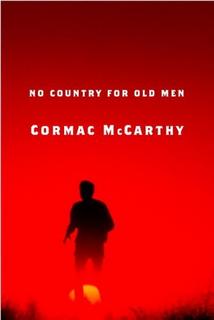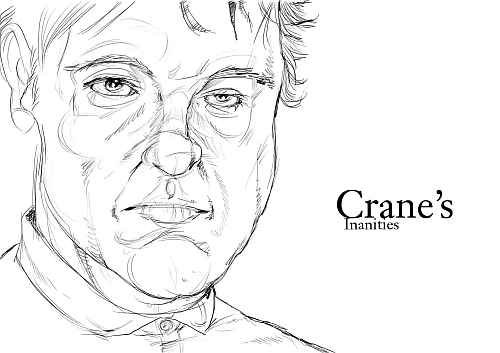 I finished this book this morning. Did you know that Cormac McCarthy doesn't always use apostrophes in his contractions? Like can't is written in his books as cant. Doesn't is spelled like doesnt. If he uses MS Word (which he probably doesn't), I'm pretty sure he writes with the spelling and grammar check off. Word would hate that (more the second example than the first as cant is an actual word). He doesn't use quotation marks either. And though you might think this would make differentiating between narration and dialogue difficult, it actually doesnt.
I finished this book this morning. Did you know that Cormac McCarthy doesn't always use apostrophes in his contractions? Like can't is written in his books as cant. Doesn't is spelled like doesnt. If he uses MS Word (which he probably doesn't), I'm pretty sure he writes with the spelling and grammar check off. Word would hate that (more the second example than the first as cant is an actual word). He doesn't use quotation marks either. And though you might think this would make differentiating between narration and dialogue difficult, it actually doesnt. The story's about a welder named Llewelyn Moss who happens across a convoy of bullet-riddled trucks while hunting antelope in southwest Texas. Inside the trucks he finds a LOT of heroin, a satchel filled with more than 2 million dollars and a man dying of gunshot wounds who asks for agua. Llewelyn takes the satchel and runs away. He wakes up in the middle of the night and returns to the scene in the middle of the night with some water. Of COURSE the place is crawling with bad guys. The bad men start combing the desert with spotlights and a lot of trucks (in one of the books most visual and suspenseful sequences), and so starts our hero on the run. He's pursued by lots of folks interested in that money, the most villainous being Anton Chigurh, a crazy man who, like Judge Holden in Blood Meridian, is so lucidly crazy, he's usually pretty persuasive. Hard trick to pull off. Chigurh is involved with all of the book's ultra-violence, much of it involving a pneumatic cattle gun, the kind the slaughterhouses use to drop cattle when they come through the chute. Hardcore.
No Country for Old Men is a great crime novel. Flat out. Literature? Maybe not, but it doesn't seem like McCarthy even wanted it to be. The novel's overall shape suggests he wanted to write something pulpy, entertaining, really fast, and with enough of his trademark high-concept fatalism to make it worthwhile for him to write. The best stuff, as it often is in books like these, are the scenes with the central villain, Chigurh (pronouned as shi-gurr), and usually before he's about to murder someone. Chigurh insists on having thoughtful, existential conversations with the people he's about to kill. Here's an excerpt from a scene where Chigurh has just gotten the drop on a man named Wells who's been hired to track Chirgurh down and kill him. McCarthy has set up the counter-assassin Wells as someone who'll have some longevity in the story -- then McCarthy has Chigurh kill him in shockingly short order. Much of what happens in this story is legitimately shocking. The following is a section of a long conversation. Chigurh's been wheedling Wells for a few pages already:
[Bell says] Do you have any notion of how goddamned crazy you are?
[Chigurh says] The nature of this conversation?
The nature of you.
Chigurh leaned back. He studied Wells. Tell me something, he said.
What.
If the rule you followed led you to this of what use was the rule?
I don't know what you're talking about.
I'm talking about your life. In which now everything can be seen at once.
I'm not interested in your bullshit, Anton.
I thought you might want to explain yourself.
I don't have to explain myself to you.
Not to me. To yourself. I thought you might have something to say.
You go to hell.
You surprise me, that's all. I expected something different. It calls past events into question. Dont you think so?
You think I'd trade places with you?
Yes. I do. I'm here and you are there. In a few minutes I will still be here.
Wells looked out the darkened window. I know where the satchel is, he said.
If you knew where the satchel was you would have it.
I was going to have to wait until there was no one around. Till night. Two in the morning. Something like that.
You know where the satchel is.
Yes.
I know something better.
What's that.
I know where it's going to be.
And where is that.
It will be brought to me and placed at my feet.
Wells wiped his mouth with the back of his hand. It wouldn't cost you anything. It's twenty minutes from here.
You know that's not going to happen. Don't you?
Wells didn't answer.
Dont you?
You go to hell.
You think you can put it off with your eyes.
What do you mean?
You think that as long as you keep looking at me you can put it off.
I don't think that.
Yes you do. You should admit your situation. There would be more dignity in it. I'm trying to help you.
You son of a bitch.
You think you wont close your eyes. But you will.
I mean, what a bastard. Even though Chigurh probably does think in that insane mind of his that he's just helping Wells end his life with dignity, he is in fact depriving Wells of any dignity at all. By the end of this scene, Wells is practically demanding Chigurh just kill him so he doesn't have to endure any more of Chigurh's calm (though crazy) demands that Wells face the hard truth of his impending death on Chigurh's terms. In Anton Chigurh, McCarthy's fashioned one of the cruelest executioners in contemporary literature -- he almost requires the condemned to agree that their impending deaths are just, and that their murderer has no other choice. To be goaded into begging for your life, and then to be told that begging is beneath you? To allow you no mental serenity in your last moments, to in fact, systematically deprive you of any peace and to prolong your emotional agony intentionally? Sadistic torture. That Chigurh probably doesn't even realize his victims don't appreciate his "help" makes him that much more complex, that much more hateful. I don't know if this character is great art, but you hang on every word he says.
McCarthy is an avowed red-stater: he says as much in a recent interview in Vanity Fair. The 60-something sheriff of the story, Bell, is likely a stand-in for McCarthy. Bell thinks a lot about the decline of society, sounding a lot like an old man who thinks everything was more innocent and more beautiful in his day. He even mentions blue hair and nose piercings as evidence of a genuinely declining moral standard. McCarthy takes great pains to justify that what Bell is thinking is more than just old-geezer-ism, as though he knows that's how it'll be taken by the reading public. He writes sentences meant to reinforce this old-man-pablum that amount to, "No really! The world really IS going to hell in a handbasket!" To me, these lines sound like McCarthy inserting himself into the story to give his considered insight on the inevitable Fall of Western Civilization. Bell says, "It starts when you begin to overlook bad manners. Any time you quit hearin Sir and Mam the end is pretty much in sight." Yeah, this sort of opinion is more at home at an old folks' home in the 1940s, but I say, "so what". If I'm going to read books by a crotchety, self-described "southern conservative", these are the sorts of ideas he's going to try and get in his novels and I'm going to have to read them. But all of Bell's crotchety but measured cynicism does give the book some gravitas, making it feel a little like, somewhere coded in this story of a drug-deal gone bad are the seeds of ... (dramtic pause)... Apocalypse.
Anyway. It's a good book and worth reading. How's that for Crane's Inanities' version of a shitty Amazon book review? Shorter post tomorrow (I hope).

6 comments:
Yeah, sounds like a great book, too bad I know the story now. Thanks.
I thought you put dabs of fingernail polish on your chigurh bites to seal up their passage so they'd suffocate and die... Maybe that is what they should save for a sequal. Nothing like seeing a cowboy with his chaps around his ankles in the middle of the desert, bending in as close to his pecker as his spine will let him, brushing tiny dabs of "Passion Pink" on the itchy red flecks.
I would like to see crime drama where the bad guy uses a pneumatic nail gun... dragging a compressor and hose around with them.. you can just see him at the bank ..holding up the teller and the bank door closes on his hose.
cuse me didnt ya see da hose, huh, could you hold the door open.. a little busy here.
A red stater huh.. cool
RR
Does it make you feel better to put a reductive, binary label like 'crazy' on Chigurh? Does it make sense to say the devil is 'crazy'?
Nice post and this fill someone in on helped me alot in my college assignement. Gratefulness you for your information.
Brim over I acquiesce in but I about the collection should acquire more info then it has.
Post a Comment